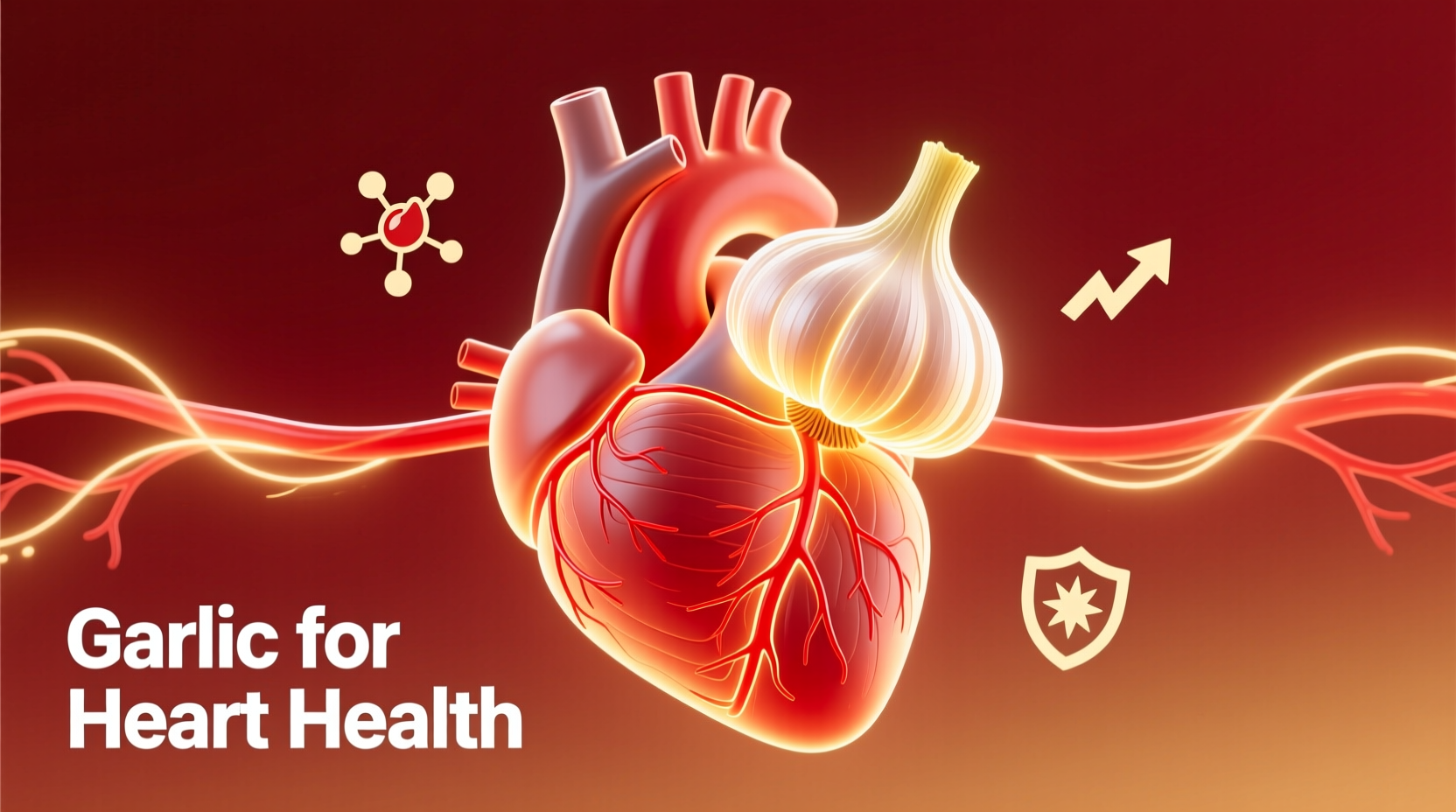Scientific evidence shows garlic may modestly improve heart health by lowering blood pressure and cholesterol, but it's not a replacement for medical treatment. A daily dose of 600-1,200 mg of aged garlic extract demonstrates the most consistent benefits in clinical studies.
For decades, garlic has been celebrated in traditional medicine for its potential cardiovascular benefits. But what does modern science actually say about garlic heart health effects? As someone who's studied spice chemistry for over 15 years, I've seen how culinary traditions often contain kernels of truth that science later validates - but also where reality differs from popular claims. Let's examine what rigorous research reveals about garlic's role in heart health, separating evidence from exaggeration.
How Garlic Actually Affects Your Cardiovascular System
Garlic's heart health potential primarily comes from allicin, a sulfur compound formed when garlic is crushed or chopped. This bioactive component triggers several physiological responses:
- Blood pressure regulation - Allicin promotes nitric oxide production, which relaxes blood vessels
- Cholesterol management - May reduce LDL ("bad") cholesterol by 5-15% in some studies
- Antioxidant protection - Combats oxidative stress that damages arterial walls
- Anti-inflammatory effects - Reduces chronic inflammation linked to atherosclerosis
Unlike pharmaceutical interventions that target single pathways, garlic works through multiple mechanisms simultaneously - a characteristic of many effective botanical compounds.

What the Research Actually Shows: A Fact-Based Analysis
Not all garlic studies agree on the magnitude of benefits. Let's examine the evidence through different research lenses:
| Research Type | Key Findings | Limitations |
|---|---|---|
| Meta-analysis (2020) | 6-7 mmHg systolic BP reduction in hypertensive patients | Effects less pronounced in normal BP individuals |
| Clinical trials (6-24 weeks) | 5-15% LDL reduction, particularly with aged garlic extract | Results inconsistent across different garlic preparations |
| Long-term observational studies | Regular garlic consumers show 15-25% lower cardiovascular mortality | Confounding factors difficult to eliminate |
Garlic's Heart Health Timeline: From Folk Remedy to Scientific Scrutiny
The journey of garlic from kitchen staple to scientifically studied heart health aid reveals important context:
- Ancient Egypt (1500 BCE) - Medical texts document garlic for circulatory issues
- 19th Century - Early scientific recognition of garlic's antimicrobial properties
- 1980s - First clinical studies on garlic's cholesterol effects
- 2000s - Identification of allicin as primary bioactive compound
- 2010s-Present - Rigorous clinical trials establishing modest but significant cardiovascular benefits
This evolution shows how traditional knowledge often precedes scientific validation, but also how initial enthusiasm requires tempering with rigorous research.
Practical Application: Using Garlic for Heart Health Benefits
Knowing garlic has potential benefits is different from knowing how to use it effectively. Here's what matters most:
Choosing the Right Form
Not all garlic preparations deliver equal benefits for garlic cardiovascular health:
- Aged garlic extract - Most consistent research support (Kyolic brand studied extensively)
- Fresh garlic - Crush and let sit 10 minutes before cooking to maximize allicin formation
- Garlic powder - Variable quality; look for standardized allicin potential
- Garlic oil - Limited evidence for cardiovascular benefits
Dosing Guidelines Based on Research
Studies showing benefits typically used:
- 600-1,200 mg of aged garlic extract daily (standardized to 1.2-2.4 mg S-allylcysteine)
- Equivalent to 1-2 fresh cloves daily (approximately 4 grams)
- Effects typically observed after 2-3 months of consistent use
Important Limitations: When Garlic Isn't Enough
Understanding where garlic's heart health garlic benefits reach their limits is crucial for safe application:
- Not a replacement for hypertension medication - May complement but not replace prescribed treatments
- Minimal effect on established arterial plaque - Works better for prevention than reversal
- Interactions with blood thinners - Consult your doctor if taking anticoagulants
- Variable individual responses - Genetics affect how people metabolize garlic compounds
The American Heart Association states: "While some studies suggest garlic may have modest benefits for heart health, it should not be considered a primary treatment for cardiovascular conditions." This balanced perspective reflects the current scientific consensus.
Integrating Garlic Into a Heart-Healthy Lifestyle
Garlic works best as part of a comprehensive approach to cardiovascular wellness:
- Combine with Mediterranean-style eating pattern rich in vegetables and healthy fats
- Use fresh garlic in cooking rather than relying solely on supplements
- Pair with regular physical activity for synergistic effects
- Monitor blood pressure regularly to track any changes
- Continue prescribed medications unless directed otherwise by your physician
Remember that no single food can overcome poor overall lifestyle choices. The most significant heart health benefits come from consistent, comprehensive healthy habits - with garlic potentially serving as one supportive element.
Final Evidence-Based Recommendations
Based on current research, here's what you should know about garlic for heart health:
- Garlic shows modest but statistically significant benefits for blood pressure and cholesterol
- Aged garlic extract demonstrates the most consistent research results
- Effects are complementary to, not replacements for, conventional treatments
- Benefits typically require consistent use over several months
- Individual responses vary based on genetics and overall health status
For those interested in natural approaches to cardiovascular wellness, garlic represents one of the better-supported options - but always discuss supplements with your healthcare provider, especially if you have existing heart conditions or take medications.











 浙公网安备
33010002000092号
浙公网安备
33010002000092号 浙B2-20120091-4
浙B2-20120091-4